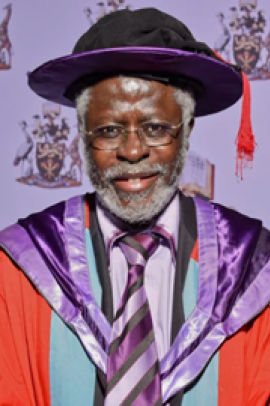Humphrey Jeremiah Ojwang
Humphrey Jeremiah Ojwang holds B.Ed.(Linguistics and Literature) degree from the University of Nairobi and MSc (Applied Linguistics/Teaching English for Specific Purposes) from the University of Aston in Birmingham, England. Currently he is working on his PhD degree in Applied Language Studies in the Department of African Languages, University of Pretoria, Republic of South Africa. His research topic is on Luo Ethnobotanical Terminology, which falls within the sub-field of Linguistic Anthropology. He is also interested in the study of Language, Culture and Identity in Eastern Africa.
Abstract
The study explores the pedagogical value of Afiican women's indigenous Icnowledge for food security with specific reference to Kanyada and Kabuoce in Boma Bay County, Kenya. The objectives of this study were to: identify women' indigenous knowledge, skills and experiences in relation to food security in rural households in Home Bay County; examine the use of discourse analysis in the study of women's indigenous ...edge for fnnd secede, consider integrating discourse analysis in undercending and mainstreaming women's knowledge in agricultural extension programmes. The methodology adopted in the study is that of Africa narrative pedagogy which takes into account the genres of oral testimonies and life-stories of women fanners; key informant interviews; field visits and observations; and reading archival and library materiels. The major findings in this ethnographic study of African women are as follows; that women play a critical role in the entire managem.ent of local agroceological resources which ensure food security and safety in rural households; women are the custodians of indigenous knowledge systems including land prepared°, cultivation, planting, weeding, harvesting end storage of food crops and food plants as part of managing their agroceological resources in rural households and communities; women farmers are also die mergers of food-stories handed down from one generation to dm next as a way of preserving and cotifyng indigenous knowledge systems Mr food security and mfery in coal households and local commmilies. There is also need for die mainstreaming of core indigenous knowledge of African women farmers in agricultural extension programmes. The reclamation and documentation of indigenous knowledge should include traditional food plant, both wild and cultivated; the reclaiming of the knowledge is vital for sustainable agricultural practices and rural development Finally, On study recommends that scesitization and public policy framework,s in agricultural extension need to take into account African feminist epistemological insights by inoorporaceg rural women farmers' indigenous knowledge for food security in fennel and non-fonnal agricultural extension programmes. Further ethnographic research is recommended along the same lines in other communities in Kenya and East Africa. Contextutirsing and mainstreaming African women's epistemological discourses, life-stories and testimonies at natiocel and international forums should be encouraged. It is recommended that Ole vanishing indigenous knowledge systems for food security be reclaimed and documented by doMg Miller research into women fanners' indigenous knowledge, skills and experiences in rural Kenya.
Research Supervisors
List Supervisors here

